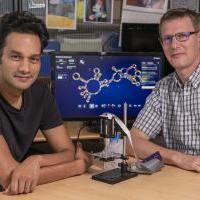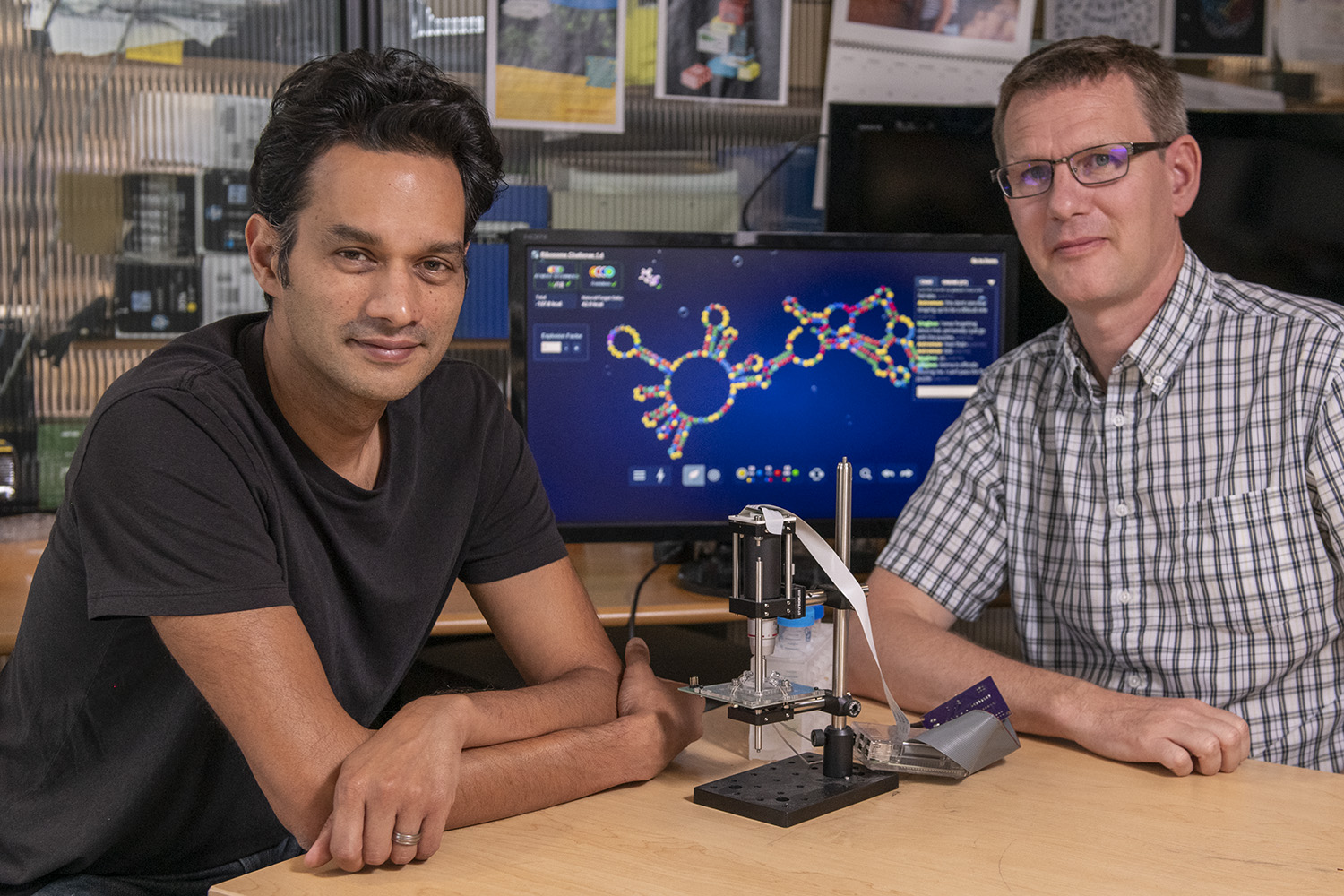
Stanford University researchers Rhiju Das and Ingmar Riedel-Kruse like to play games. Specifically, they are champions of scientific discovery games – games that are designed so that anyone can play and, in doing so, contribute to solving the hardest questions in science.

“There’s this paradigm of scientific discovery games and it may sound silly or far-fetched, but in the last 10 years it’s led to important scientific discoveries in several different disciplines,” Das said. “We want more people to play the games, more people to create these games, and more people to realize that this is a legitimate mode of discovery.”
Both Das and Riedel-Kruse have developed their own games. Das, an associate professor of biochemistry, developed Eterna, an online puzzle game where players design molecules for RNA-based medicines. Eterna has engaged over 200,000 players. These non-experts have begun writing their own peer-reviewed manuscripts and have organized their own yearly Eternacon convention at Stanford.
Riedel-Kruse focuses on educational games. In this realm, he has developed biotic games, where people can playfully interact with living cells, such as one game where people play soccer with light-seeking microbes.
As part of a review they wrote for the Annual Review of Biomedical Data Science, published July 20, they estimate about a dozen of these games have been developed in the last decade.
“These games layer a playful aspect on top of the science, which adds motivation and can be educational,” said Riedel-Kruse, who was an assistant professor of bioengineering at Stanford when he did the work. “It’s also a window into how science really works – professional scientists are curious and they play around with ideas.” Riedel-Kruse recently joined the faculty at the University of Arizona.
Bringing science to the people
In their review, Das and Riedel-Kruse traced the origins of scientific discovery games back to the 1800s to early bird survey efforts that relied on volunteers, a category of science now called citizen science. They also credit online crowdsourced work – exemplified by Wikipedia and Amazon Mechanical Turk – and video games with setting the stage for scientific discovery games.
Some current scientific discovery games
Eterna: an online game in which players design RNA molecules for medicine that are actually tested experimentally at Stanford.
Foldit: the pioneering desktop game for modeling the 3D structures of proteins
Zooniverse: a collection of ongoing and archived online citizen science projects, including Galaxy Zoo (galaxy classification) and Whale FM (organization of orca and pilot whale calls)
NOVA Labs: educational online SDGs run by PBS’s NOVA
Phylo: pattern-recognition puzzles that can help genetic disease research
EyeWire: a 3D puzzle game for mapping neurons
Project Discovery: a mini-game in the massive multi-player computer game EVE online that supports different research projects. Previously, Emma Lundberg, a visiting associate professor of genetics at Stanford, led a Project Discovery team that aimed to improve understand of proteins’ locations.
Most experts consider Foldit the first scientific discovery game. This online puzzle game, developed by researchers at the University of Washington in 2008, challenges players to fold proteins as perfectly as possible, given specific rules and tools. As with many of these games, it engages players to join into a supercomputer running multiple puzzles at once – but with the advantage that they have the nuanced reasoning skills and adaptability of humans. The researchers behind Foldit study high-scoring solutions to see if players have created novel protein structures. In 2011, players resolved the structure of an enzyme involved in the reproduction of an HIV-like retrovirus for the first time.
Along the same lines, both Das and Riedel-Kruse are working on translating skilled game play into laboratory success. With Eterna, Das and his lab tested player-generated solutions in test tubes and used those results to both further their research and reward players in the game. In the future, Das hopes they can run these laboratory experiments not just in test tubes but with living cells, directed by Eterna players. Riedel-Kruse has done work on robotic biology labs controlled remotely online and sees the possibility of integrating such systems to enable real-time laboratory scientific discovery games. He is also working on ways to modify his biotic games for online play.
“What excites me is trying to create next-generation scientific discovery games that include other experimental modalities,” Das said. “You could imagine almost every other aspect of foundational biological research, such as electron microscopy of molecules or real-time interaction with cells, becoming part of a game and leading to the invention of new medicines.”
Scientific discovery games that are closely intertwined with laboratory experiments could serve the dual purpose of familiarizing people with what goes on in a lab while also getting ideas from a more diverse group of people.
“The amount of creativity out there is so much larger than what the traditional scientific community has on its own,” Riedel-Kruse said. “Large numbers of people could make tremendous intellectual contributions just through sheer scale. Additionally, we have examples of a one-in-a-thousand or one-in-a-million person outside the university who finds something the rest of us missed.”
Games are science, too
Given how scientific discovery games are growing and evolving, Das and Riedel-Kruse are eager to push them further. They want playing and creating these games to be easier so more people can contribute to them. Since most of these games so far are some kind of puzzle, they see potential for expanding into other genres of video and computer games.
“There are games where you get together in teams and you explore worlds and carry out battles and there are real-time strategy games, like StarCraft,” Das said. “There are entire genres that haven’t yet been tapped into for science discovery games.”
These researchers also point out the need for research not just through the scientific discovery games but about these projects themselves. There are no studies yet on how these games affect and educate players, the best ways to design them and the ethics of producing medical treatments for real people based on the creativity of the crowd.
Whatever direction they take next, Das and Riedel-Kruse aim to achieve one goal above all others: the evolution of games as a potentially powerful avenue for serious science.
Das and Riedel-Kruse are both members of Stanford Bio-X.
To read all stories about Stanford science, subscribe to the biweekly Stanford Science Digest.
Stanford researchers want more video games - for science - by Taylor Kubota - Stanford News - July 21st, 2019


